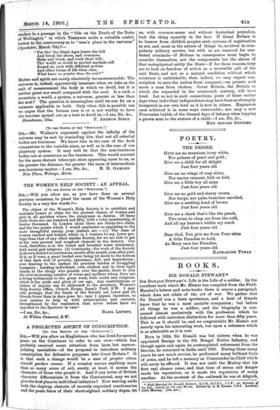A NEGLECTED ASPECT OF CONSCRIPTION.
ITO THE EDITOR OF THE "SPECTATOR."]
you allow an Englishman who has lived for several years on the- Continent to refer to one view—which has probably received scant attention from keen but narrow- judging specialists—of the proposal to introduce military conscription for defensive purposes into Great Britain ? It is that such a change would be a case of propter vitam ritTvdi perdere causes. If a country meaos anything more than so many acres of soil, surely, at least, it means the character of those who people it. And if any notes of British character differentiate it from the Continental, may we not give the first place to individual initiative ? Now waiving aside both the claptrap rhetoric of secretly organised reactionaries and the panic fears of their short-sighted military dupes, let ' us, with common-sense and without hysterical prejudice, look the thing squarely in the face. If Great Britain is to borrow from childish peoples such systems of registration as are, and must in the nature of things be, involved in com- pulsory military service, but with us are reserved for con- victed criminals—if Britons in consequence must begin to consider themselves, not the components but the slaves of that metaphysical entity the State—if for these reasons they are to look on freedom of action as a reversible gift of the said State, and not as a natural condition without which existence is unthinkable, then, indeed, we may expect con- scription to save the nation from conquest,—as prussic acid saves a man from cholera. Great Britain, the Britain to which she expanded in the nineteenth century, will have lived. Let us not in such connections prate of those earlier days when individual independence may have been as strangely hampered in our own land as it is now in others. Expansion once achieved is in some ways irrevocable ; nor may a new Procrustes babble of the blessed days of infancy when lopping a grown man to the stature of a child.—I am, Sir, &c.,
MEN BEFORE SYSTEMS.










































 Previous page
Previous page